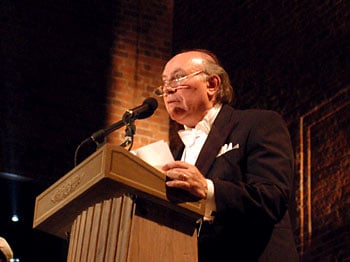Imre Kertész
Banquet speech

Imre Kertész delivering his banquet speech. Copyright © Nobel Media AB 2002
Photo: Hans Mehlin
English
German
Imre Kertész’s speech at the Nobel Banquet, 10 December 2002
(Translation)
Today we are experiencing a globalization, an inflation of the Holocaust. The Holocaust survivor who knows Auschwitz through the experience of suffering, observes it all from the perspective assigned to him. He keeps silent or gives interviews to the Spielberg Foundation, he accepts the compensation payments promised him after a fifty-year delay, or, if he is prominent, he makes a speech in the Swedish Academy.
And he asks the question: what is he bequeathing, what is his spiritual legacy? Has he enriched human knowledge with his tale of suffering? Or has he only born witness to the unimaginable degradation of the human being, in which there is no lesson, and which ought to be forgotten as quickly as possible? I do not see it that way. I have not changed my opinion that the Holocaust is a trauma of European civilization. And it is becoming a life-and-death matter, whether this trauma lives on as culture or neurosis, in a constructive or destructive form in European societies.
However, all that will be a decision of the future, which I can scarcely hope to influence any longer. I have endeavoured – perhaps it is not sheer self-deception – to perform the existential labour that being an Auschwitz-survivor has thrust upon me as a kind of obligation. I realize what a privilege has been bestowed on me. I have seen the true visage of this dreadful century, I have gazed into the eye of the Gorgon, and have been able to keep on living. Yet, I knew I would never be able to free myself from the sight; I knew this visage would always hold me captive. Over the decades and one by one I rejected the misleading slogans of a misleading freedom such as “an inexplicable historical error”, “cannot be rationalized”, and other tautologies of that kind. They are the gestures of one who wishes to stand above the fray. I have never succumbed to the temptation of self-pity, nor, it may be, to that of true sublimity and divine perspicacity, but I have known from the beginning that my disgrace was not merely a humiliation; it also concealed redemption, if only my heart could be courageous enough to accept this redemption, this peculiarly cruel form of grace, and even to recognize grace at all in such a cruel form. – And if you now ask me what still keeps me here on this earth, what keeps me alive, then, I would answer without any hesitation: love.
Copyright © The Nobel Foundation 2002Nobel Prizes and laureates
Six prizes were awarded for achievements that have conferred the greatest benefit to humankind. The 12 laureates' work and discoveries range from proteins' structures and machine learning to fighting for a world free of nuclear weapons.
See them all presented here.
